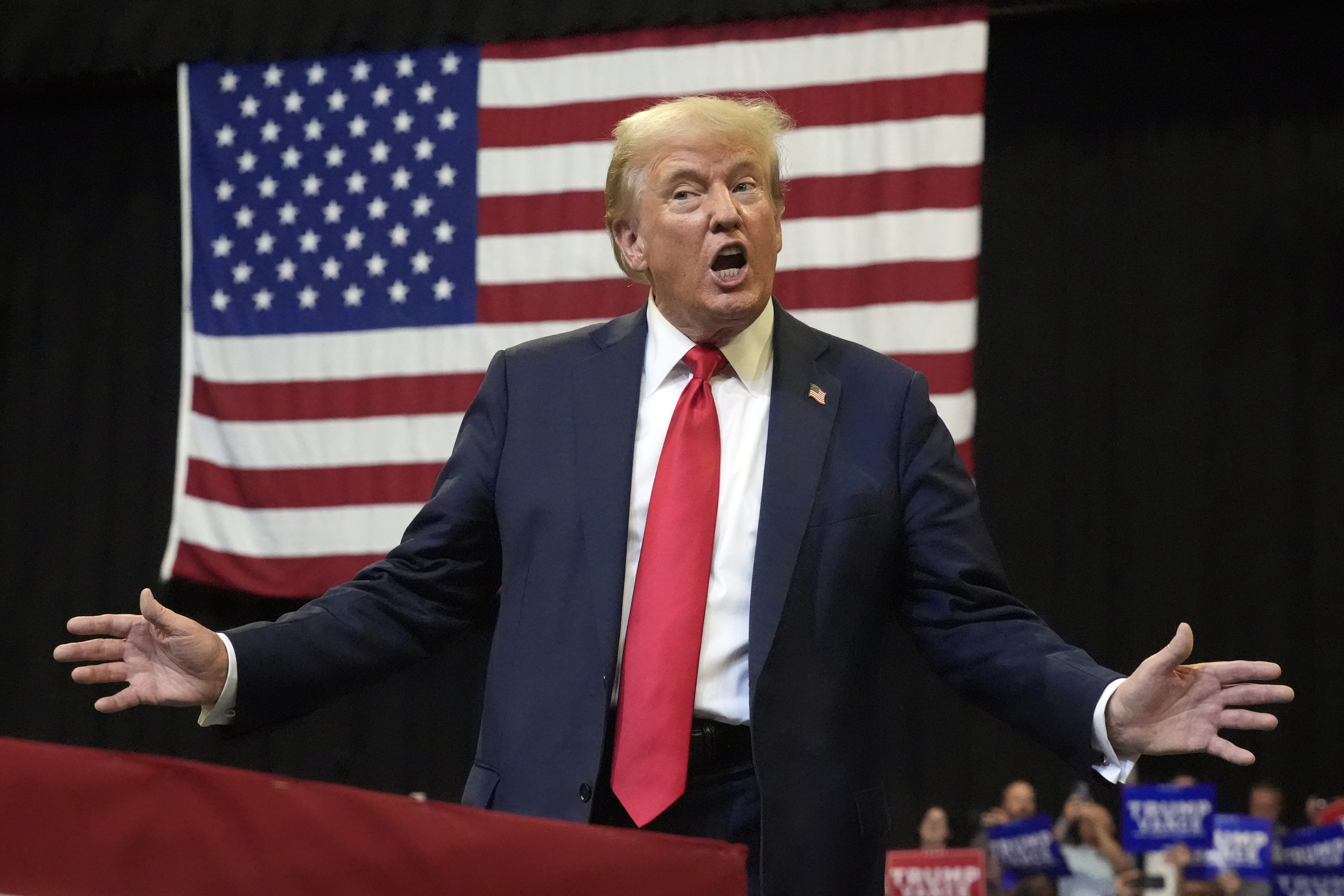Donald Trump will have another opportunity Wednesday to recalibrate his presidential comeback bid, this time with a rally and speech in North Carolina that his campaign is billing as a significant economic address.
Set in a Democratic city surrounded by staunchly Republican mountain counties, the event carries both national and local implications for the former president.
Republicans are looking for Trump to focus the scattershot arguments and attacks he has made on Vice President Kamala Harris since Democrats elevated her as their presidential nominee. Twice in the last week, Trump has fumbled such an opportunity, first in an hourlong news conference at his Mar-a-Lago estate in Florida, then in a 2 1/2-hour conversation on the social media platform X with CEO Elon Musk.
The latest attempt comes in the state that delivered Trump his closest statewide margin of victory four years ago and that is once again expected to be a battleground in 2024. Trump won North Carolina over Democrat Joe Biden in 2020 by less than 1.4 percentage points — about 74,500 votes — and he can't afford to have the state's 16 electoral votes shift to Democrats for the first time since Barack Obama prevailed here in 2008.
"We look forward to welcoming President Trump to western North Carolina and talking about how he will restore our economy," said North Carolina Republican Chair Jason Simmons. "This visit shows Republicans understand that North Carolina is bigger than Charlotte and Raleigh — beyond I-77 and I-95 — and these communities here are important."
The question, of course, is whether Trump can stick to a tight frame on the economy rather than default to his usual stemwinding and extensive grievances.
Certainly, Trump has been hitting Harris, and Biden before her, on the economy. But he's done it mostly with hyperbole, such as exhortations of a "Kamala crash ... the likes of 1929" to go with other sweeping generalizations, like warning of "World War III" and U.S. suburbs being "overrun with violent foreign gangs." Trump made almost verbatim claims about Biden's potential election in 2020.
Trump has in recent weeks claimed that "you wouldn't have had inflation" had he been reelected, ignoring the global supply chain interruptions during the COVID-19 pandemic; COVID-19 spending boosts that included a massive aid package Trump signed as president; and the global energy price effects of Russia's invasion of Ukraine.
The former president has additionally promised an immediate fix to higher prices in another term. His principal policy proposals on that front are an uptick in drilling for oil (U.S. production has reached its highest levels ever under Biden), new tariffs on foreign imports and an extension of his 2017 tax cuts that are set to expire under the next administration.
But at Mar-a-Lago, in his talk with Musk, on his own Truth Social platform and at his most recent rallies and other interviews, Trump has overshadowed his own economic agenda. He's fixated on personally attacking Harris, falsely accusing her of misrepresenting her own race and ethnicity. He's slipped back into old attacks on Biden and repeated the lie that his 2020 defeat was due to systemic voter fraud. Most recently, he's started lashing out over the size and enthusiasm of the crowds Harris is drawing on the campaign trail, even falsely claiming a photo of her rally was fabricated with AI.
Those factors have made it difficult for Trump to render a clearer policy contrast with the Democratic ticket, no matter how much his aides push the idea of such a reframing.
Announcing his speech, Trump's campaign listed the effects that inflation has had in North Carolina since Biden's inauguration in 2021. The campaign did the same thing ahead of Trump's Aug. 3 rally in Atlanta. Trump even read the statistics from the teleprompter — but did so only near the end of 91 minutes at the podium and long after a few thousand of the once-capacity crowd had left.
North Carolina, meanwhile, is another battleground state where Trump must contend with the newly emboldened Harris campaign in territory that had appeared to be trending toward Republicans with Biden as the Democratic nominee.
The Harris campaign has more than 20 offices and more than 170 staffers across North Carolina. Since the vice president became the presumptive nominee, nearly 12,000 new volunteers have signed up, the campaign said; more than 9,500 volunteers have worked a volunteer shift in some capacity in that same span, with nearly 90% of that group doing so for the first time.
State GOP spokesperson Matt Mercer said there are more than a dozen "Trump Force 47" offices in North Carolina, with more than a dozen paid staffers working to expand the volunteer base of "Trump Force 47 Captains" across the state.
Asheville and the surrounding area will prove key to the outcome. Set against the Blue Ridge Mountains, the city has a liberal cultural identity with a Bohemian feel and live music and craft beer scene that attracts left-leaning students, retirees and tourists. But the surrounding western North Carolina mountain counties have grown increasingly Republican in recent election cycles.
